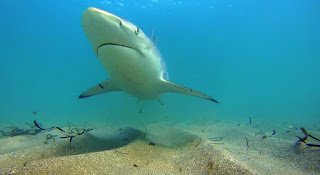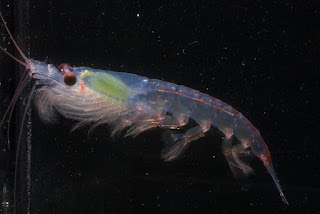1. Fisheries Production Could Decline by 60 Percent
 A new study in Science finds that if climate change is allowed to continue at its current rate, fisheries production could plunge by 60 percent. This would be a threat to world food and economic security. Cold water from melting ice sheets would disrupt ocean circulation patterns. The study examined temperature change, and not other climate factors such as ocean acidification.
A new study in Science finds that if climate change is allowed to continue at its current rate, fisheries production could plunge by 60 percent. This would be a threat to world food and economic security. Cold water from melting ice sheets would disrupt ocean circulation patterns. The study examined temperature change, and not other climate factors such as ocean acidification.Read More...

Read More...
---------------------------------------------------
3. North Atlantic is Getting Less Salty
Over the past decade, the North Atlantic’s salinity has been decreasing. It is not known whether this phenomenon is due to an influx of freshwater from ice or land or whether it is the result of some other natural, long-term cycle. Researchers attribute the immediate cause to changes in ocean circulation. But they warn that further decline in salinity—from Greenland's melting glaciers—“could impact fish stocks and the ocean’s ability to absorb CO2.”
Read More...
---------------------------------------------------
4. Antarctic Krill Break Down Microplastics into Nanoplastics
 Microplastics, which are plastic fragments less than five millimeters in diameter, are being turned into nanoplastics (even smaller plastic fragments) by the digestion process of Antarctic krill. Microplastics can be directly released into the ocean environment or can be broken down from larger pieces of plastic. This finding "warrants significant attention to nanoparticle toxicology in the discussions surrounding global plastic pollution."
Read More...
Microplastics, which are plastic fragments less than five millimeters in diameter, are being turned into nanoplastics (even smaller plastic fragments) by the digestion process of Antarctic krill. Microplastics can be directly released into the ocean environment or can be broken down from larger pieces of plastic. This finding "warrants significant attention to nanoparticle toxicology in the discussions surrounding global plastic pollution."
Read More...
 Microplastics, which are plastic fragments less than five millimeters in diameter, are being turned into nanoplastics (even smaller plastic fragments) by the digestion process of Antarctic krill. Microplastics can be directly released into the ocean environment or can be broken down from larger pieces of plastic. This finding "warrants significant attention to nanoparticle toxicology in the discussions surrounding global plastic pollution."
Microplastics, which are plastic fragments less than five millimeters in diameter, are being turned into nanoplastics (even smaller plastic fragments) by the digestion process of Antarctic krill. Microplastics can be directly released into the ocean environment or can be broken down from larger pieces of plastic. This finding "warrants significant attention to nanoparticle toxicology in the discussions surrounding global plastic pollution."
---------------------------------------------------
5. Canada Announce $1.5B Plan to Protect Coasts
 The Canadian government has released its $1.5 billion "Oceans Protection Plan", which includes measures to mitigate damage from oil spills and improve shipping. "The largest investment ever made to protect Canada's coasts and waterways," the plan will be implemented over the next 11 years. Among other things, the plan aims to reduce shipping noise, which impacts endangered killer whales and improve preparation for oil spills.
The Canadian government has released its $1.5 billion "Oceans Protection Plan", which includes measures to mitigate damage from oil spills and improve shipping. "The largest investment ever made to protect Canada's coasts and waterways," the plan will be implemented over the next 11 years. Among other things, the plan aims to reduce shipping noise, which impacts endangered killer whales and improve preparation for oil spills.
---------------------------------------------------
Be sure to "LIKE" http://facebook.com/SeaSave to ensure our "Week in Review" is delivered to your newsfeed every Friday.
Be sure to "LIKE" http://facebook.com/SeaSave to ensure our "Week in Review" is delivered to your newsfeed every Friday.
Sea Save Foundation is committed to raising awareness of marine conservation. The Week in Review is a team effort produced by the Sea Save staff to provide a weekly summary of the latest in marine research, policy, and news.
